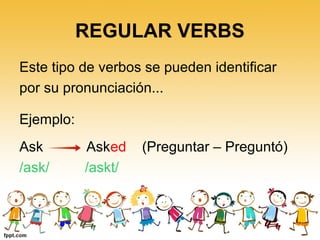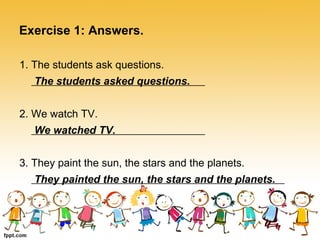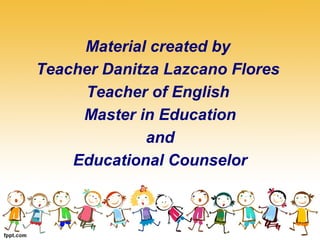School trip
- 2. PAST VERBS Los verbos se pueden dividir entre: Verbos regulares Verbos irregulares ¿Cómo podemos identificarlos?
- 3. REGULAR VERBS Los verbos regulares son aquellos que cuando se usan en el pasado sólo agregamos una -ed final. Ejemplo: Ask Asked (Preguntar - Preguntó)
- 4. REGULAR VERBS Este tipo de verbos se pueden identificar por su pronunciación... Ejemplo: Ask Asked (Preguntar – Preguntó) /ask/ /askt/
- 5. REGULAR VERBS Coloque su mano sobre sus cuerdas vocales y pronuncie en inglés el verbo ASK /ASK/. Al hacerlo se habrá dado cuenta que las cuerdas vocales no vibran. Por lo tanto la -ed final que agregamos al verbo en el pasado debe pronunciarse como un sonido /t/. ASKED /ASKT/
- 6. REGULAR VERBS Existen dos tipos más de estos verbos. Aquellos verbos en que su sonido final hacen que nuestras cuerdas vocales vibren o terminan con un diptongo. Ejemplo: Love Loved /lov/ /lovd/ Play Played /plei/ /pleid/
- 7. REGULAR VERBS Con estos dos verbos (love y play) la pronunciación de la -ed final es /d/. Finalmente si el verbo esta escrito con una d o t final, la pronunciación de la -ed final será /id/. Visit Visited /visit/ /visitid/ Add Added /ad/ /adid/
- 8. Exercise 1: Turn the sentences into past. 1. The students ask questions. ___________________________________ 2. We watch TV. ___________________________________ 3. They paint the sun, the stars and the planets. ___________________________________
- 9. Exercise 1: Answers. 1. The students ask questions. The students asked questions. 2. We watch TV. We watched TV. 3. They paint the sun, the stars and the planets. They painted the sun, the stars and the planets.
- 10. IRREGULAR VERBS Los verbos irregulares son aquellos que cuando se usan en el pasado pueden cambiar totalmente. Ejemplo: See Saw (Ver – Vio o Veía) /si:/ /so:/ (los dos puntos = alargar sonido)
- 11. Exercise 2: Turn the sentences into past. 1. The students draw some pictures. ___________________________________ 2. We buy some souvenirs. ___________________________________ 3. They take some notes in the school trip. ___________________________________
- 12. Exercise 2: Answers. 1. The students draw some pictures. The students drew some pictures. 2. We buy some souvenirs. We bought some souveniers. 3. They take some notes in the school trip. They took some notes in the school trip.
- 13. DON'T FORGET!!!
- 14. REGULAR VERBS LIST INFINITIVE PAST INFINITIVE PAST ARRIVE ARRIVED PLAY PLAYED ASK ASKED SCRATCH SCRATCHED JUMP JUMPED SCREAM SCREAM LIKE LIKED STOP STOPPED LISTEN TO LISTENED TO TALK TALKED LOOK AT LOOKED AT VISIT VISITED PAINT PAINTED WATCH WATCHED
- 15. IRREGULAR VERB LIST INFINITIVE PAST INFINITIVE PAST BE WAS / WERE HAVE HAD BUY BOUGHT MAKE MADE DRAW DREW SEE SAW EAT ATE TAKE TOOK GO WENT WEAR WORE
- 16. Material created by Teacher Danitza Lazcano Flores Teacher of English Master in Education and Educational Counselor















